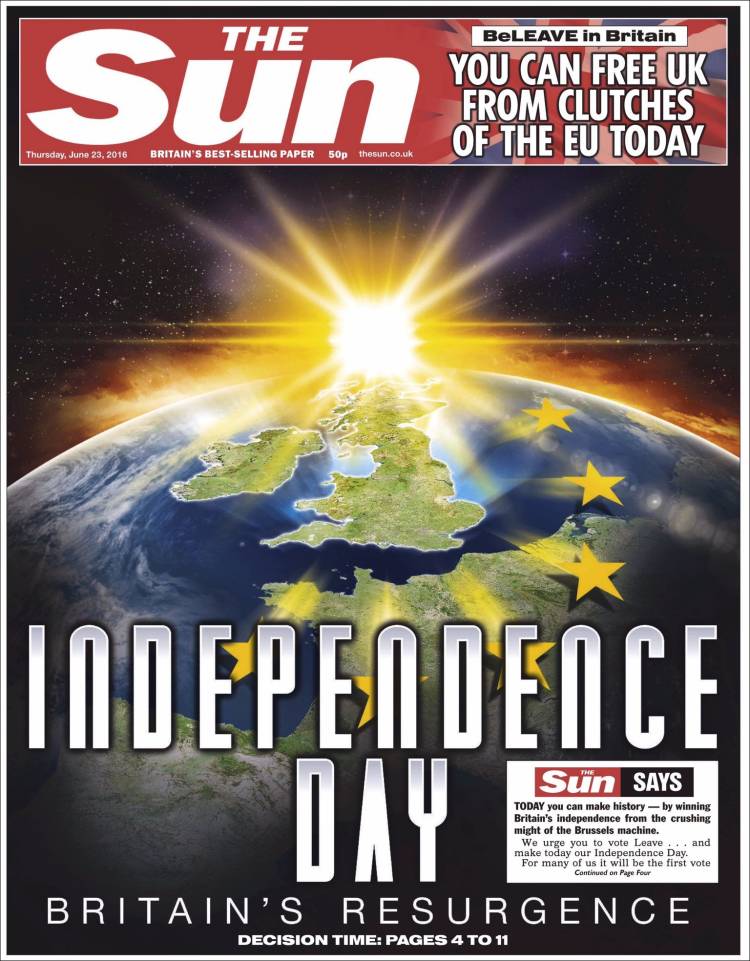I can't vote, basically because I'm a Finn living in Finland. However I've been following this thread and the campaigns very closely and these are my thoughts about the whole thing.
We've seen a huge amount of misinformation flung around, but that's not my greatest worry, it's the lack of information many possess. I'm not only talking about facts about economics, immigration or whatnot, but the basic political processes. I'm talking about civic skills everyone should have as it is fundamental for keeping up working democracy.
Less and less people are voting in elections all across Europe, there's less political engagement, more apathy and in result more resentment against the "system". Politics is seen as an outside force acting upon powerless people and people feel disenfrachised. That's why the Leave campaign has been very powerful - the message of "taking back control" is positive and empowering for many. In my view this is the first time in years some people feel their vote actually counts and their voices are heard. To me that's a positive thing.
The negative thing about disengagement from politics is the rise of populism. For uninitiated the systems we have in place seem monolithic, obscure and opaque. And when politicians talk about policies, the language is often far removed from peoples experiences - it's the language of the system. Populist rhetoric is different, it creates a simplified caricature of society that's easily understandable and offers simple solutions. Its appeal is just that, understandability and simplicity, it offers an easy way to engage and a direction to funnel the built up frustration.
But after the referendum is over and the results are in, what then?
One thing about voting, that I feel many don't consider, is that it happens at the end of the process. Voting is selecting between candidates, parties or policies. But less people consider where these people and policies come from. What we usually don't see is the work, endless debates and meetings that go into selecting the candidates and producing the programmes. From outside perspective parties just come out with a platform and a set of candidates seemingly without any input from the public, again pushing the people away.
I am a society secretary for Social Democratic Party in my city. Our party is in the process of updating the programme of principles, which started few years ago. We've held open workshops and discussion events for party members about it, and now the first draft of the programme is open for everyone to comment on. Through these comments a second draft will be formed later this year which again goes to comments. The final program will be handled in the party congress next year, where there will be commitees and votes on last changes. Of course the people in the congress are voted there by the members of the party and every member is eligible to be a candidate. The process is long and the amount of input that we've had is substantial. The party members are not only politicians, but thousands of people from every walk of life who have an input or opportunity for input.
Now, this is just one party and one programme. Things can be different in different parties or countries. But the point is, that it's not just party leaders who dream up lofty goals but the process can be inclusive and voices can and will be heard.
What I'm after is is: yes, you can have a voice. No, you won't always get your way. Yes, you can affect the policies and people brought forth.
So if anything, I hope this campaign has given a spark for new people to be more involved in politics. Even if it means voting more often from now on. But if you really want to start changing things there are few suggestions.
1) Engage. Consider joining a local chapter of a party, civic group or NGO. You don't have to consider being a politician to join any of those. Pick a party that you feel close to or an organization work in area you're interested in and go from there. Don't worry if you don't understand everything, everyone starts from somewhere and there are many things where you can leave your mark on.
2) Inform yourself. Read party platforms and backgrounds. Based on this thread I'd also suggest everyone to check the political groups of the European parliament and see what they stand for. Also check which national party is in which group, and vote based on that. For example I want the Socialists and Democrats to win the next EP election, therefore I vote for SDP in Finland. In Britain I'd vote for Labour for that reason, in Italy it'd be Partito Socialista.
Remember, MEP's don't represent their countries, but their parties like in *gasp* parliament.
3) Talk with people. Talk about real issues about what's happening in your community. Be open on what you like and what you don't like. Some of the most vibrant and insightful discussions I've had are with total strangers in pub that started on simple things.
4) Remember. Politics is not just parties and politicians, it's civic engagement.




















